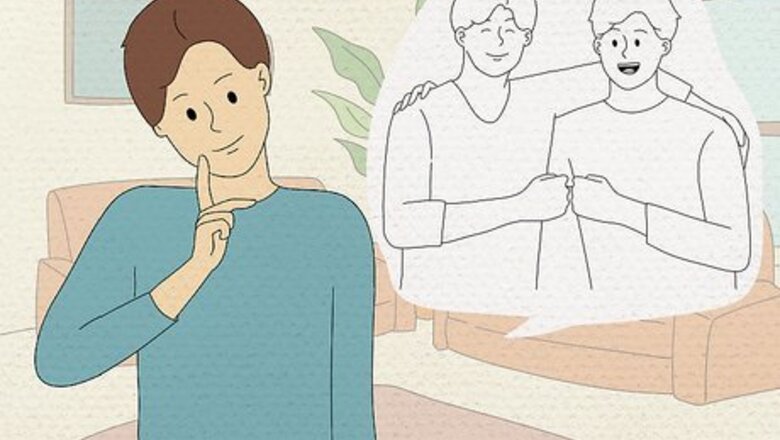
views
Using Body Language
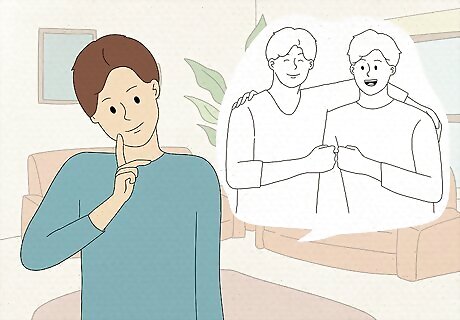
Imagine every person you meet is an old friend. Think of a person you care about who you have known a long while, and picture that person when you first meet someone. This can trick your body and facial expressions into relaxing and becoming more open and friendly. For example, your eyebrows will soften, and smiling will come naturally. Additionally, when you pretend to like someone it is easier to actually start to enjoy their company.
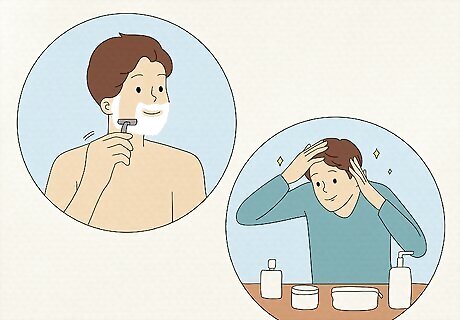
Present a neat appearance. Pay attention to how you will appear to others. Brush your hair, trim your facial hair and be sure to wash your face and neck before attending a social situation. If desired, use minimal makeup, and keep it natural for first impressions. Choose clothing colors and styles that compliment your figure but are not over flashy, skimpy or inappropriate (don’t wear a suit to a casual encounter or jeans to a formal event) for the event or meeting you will be attending.

Smile. Smiling can help keep you in a positive mood, and people will be more willing to approach a person who seems friendly and is enjoying themselves. Be sure not to smile immediately when you meet someone, though. First, pause and look at the person’s face when greeting them, then smile warmly and let it show in your eyes as well. This makes them feel as if your smile is meant only for them.

Make eye contact. When you make eye contact with someone, it signals that you are wanting to connect and are approachable. If you are interested in someone, occasionally look at them, no matter who is talking, to show that you want to see how they react. During conversations, hold eye contact for as long as is comfortable. One trick is to pretend your eyes are glued to the other person’s eyes with sticky taffy. Don’t break eye contact until a few moments after they are done speaking. Slowly and reluctantly look away, pretending like you are stretching the sticky taffy between you until it breaks. Another trick is to count the number of times the other person blinks while you are having a conversation. Know that some people may be uncomfortable with this type of attention. If you notice that the other person seems to be reacting negatively to your behavior or seems nervous, break eye contact more often .

Turn your body toward the person. People pay attention to the way you act towards them. When you first meet someone, turn your body completely toward them so you face them directly. When you turn toward someone this way, it tells the other person that you feel they are very special.

Don’t fidget. Moving around a lot or using frequent hand motions near your face can make the other person feel unimportant or that you are anxious to get the conversation over with. It can even give the impression that you can’t be trusted. Earn credibility by keeping your eyes on the other person during the conversation and not fidgeting, twitching, wiggling, squirming, hair-twirling or scratching.

Keep an upright posture. A straight but comfortable posture can give the impression of confidence. Hold your head high, put your shoulders back and step lightly. Move with self-assurance and poise, and sit with your back straight. Don’t stare at your feet, make your back overly rigid or slump over. One trick you can use to help you do this is to visualize a leather bit is hanging from the ceiling or doorway. Pretend to take a bite on the leather bit. This will put a sweeping smile on your face, keep your posture lifted upright and your feet weightless.

Pay attention to body cues. Not only do you want to utilize body language that will attract people to you, but you need to be able to read others’ body cues as well. When you understand how people are feeling by the expression on their face, posture, ect., you will be able to react appropriately. People may give you clues that they are engaged, bored, disagree with you or are ready to flirt, and if you can recognize them, you will know what to do next. Look for a genuine smile. When a person smiles, the corners of his or her eyes will crinkle and the cheeks will lift along with the mouth. This is a true smile and means the individual is enjoying your company. See where the individual's feet are pointed, while either sitting or standing. if the feet are pointed toward you, then the person is having a good time with you. Likewise, if they are angled away, then that person is ready to leave. While a torso facing you can be a sign that the other person is engaged, turning one's belly in another direction shows that that person may be defensive or not enjoying the conversation. Fidgeting hands or legs and arm or leg crossing can signal that the person is anxious, bored or angry.

Make contact. Move closer, and check to see how the other person reacts. If they tense up or seem nervous, then gradually increase a little more space between you. If they seem more comfortable or encourage the closeness, touch an arm to build more positive energy.
Knowing What To Say
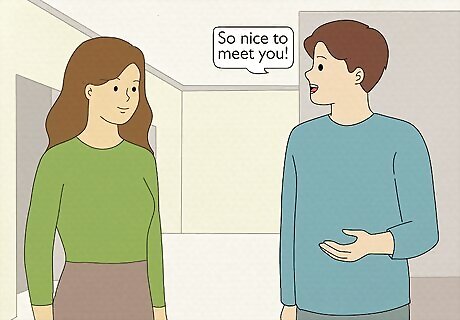
Greet the person. Always remember to give an introductory greeting—even something as informal as “hello" works fine in most situations. This opens up communication between you and sets the tone for the interaction. If the other person hasn’t noticed you, you will now be on their radar. Tell the person your name and inquire about theirs if it isn’t offered. Tell the person, “So nice to meet you” or something along those lines that tells them you are happy to be talking with them.
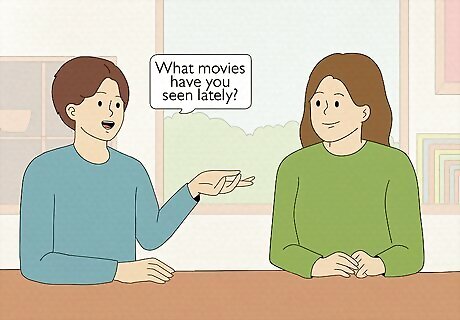
Ask questions. One of the biggest things to remember when meeting and trying to attract new people is that people like to talk about themselves. If you seem genuinely interested in them, they may seek you out again or become more curious about you. Find out as much about the person as you can—ask what they like to do, the things they enjoy or find interesting or what their goals are. Open-ended questions work the best because they encourage the person to share more information. Start with a compliment, such as one regarding their outfit. If they just performed or spoke during a conference or meeting, for example, then complement them on what they did or said. If you know about their work, find something about it to praise. Say something like, “I love your shoes” or “I really admired what you said…” If you are attending a party or other special event, you might ask, “How do you know the host?” You can ask questions like, “What’s your favorite type of music” or “What movies have you seen lately?” as ice breakers. Point out something you have in common, such as “It looks like we’re both wine/art/fashion fans. What is your favorite kind?”

Remember names. Remembering someone’s name is a sure way to come across as interested. Repeat the name after you hear it out loud. Then, try to remember it with a mnemonic device, such as a rhyme or alliteration, by repeating it in your head. Something like Joe, Joe from So-Co can work wonders to help you put a face to a name later.
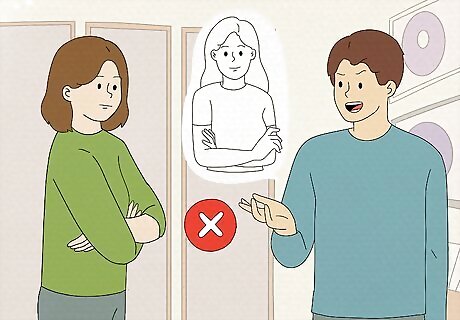
Avoid certain topics. Negative energy tends to push people away. Don’t complain, insult the person, gossip or use sarcasm during your conversation. Stay away from controversial topics or ones that may make you seem superficial, such as money, religion or health.
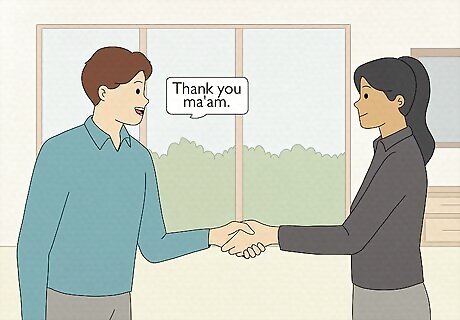
Be polite and respectful. Being a little more formal than necessary and using a sign of respect can earn you positive attention. Use words like “sir” and “ma’am” to refer to older individuals or superiors and always be sure to say, “thank you” and "you're welcome."

Be open, honest and helpful. These factors are always important in any relationship but can be especially beneficial in a professional environment where information can sometimes be guarded. If there is something you don’t know but can find out for the person, let them know that you will be seeking an answer for them. This shows that you are willing to go out of your way to help. Try phrases like, "Here's what's happening,” “How can I help?” or "I'll find out." Offering to help is a great way to earn appreciation and gratitude. If you can make an impact on another person’s success, then go for it. People will notice you, and you will begin to attract more people who like your proactive, supportive nature. Don’t be afraid to admit your weaknesses. People like those who are willing to confess what they need to work on or who aren’t afraid to acknowledge when they need help. Showing some humility will go a long way to make people like you.

Offer words of encouragement. Validation from others can inspire us to work harder so we achieve more. You can really make a positive impact by offering words of encouragement. "I believe in you" is a heartening and reassuring thing for someone to hear. It also greatly increases your likeability factor.
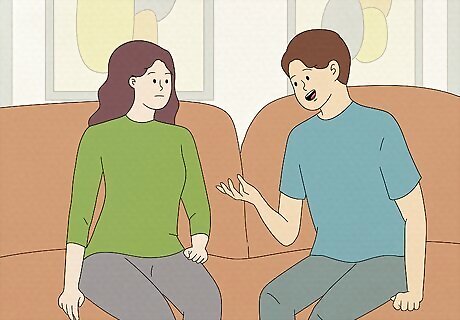
Talk more. People like those who aren’t afraid to fill the silences. When people are quiet during conversations, we tend to wonder what they are thinking and if they like us. When you let your thoughts be heard, you take the guesswork out of the interaction, and make others feel at ease. If you need something to talk about, share good news. Be the person who has the positive outlook and has something uplifting to say. This could be anything from good national or world news, to good news for a company or organization. It could even be something personal, like the birth of a child. Have a few funny or interesting stories ready. You can start the conversation off this way after your introduction to show that you are easy-going. These can also be used to fill silences.

Exit the conversation when you’ve made a good impression. Excuse yourself and repeat the person’s name to leave the person feeling good after your interaction. The key is to make the person want something more from you, perhaps another conversation or maybe they are curious about something you said or did. Excuse yourself and ask for a number or email exchange before busying yourself with some other task or conversation. Say “It’s been a pleasure to get to know you, John.” Some relationship counselors recommend waiting to consummate a romantic relationship. Holding off can increase attraction, allowing you to try a relationship and get to know the person first.
Cultivating Attractive Character Traits
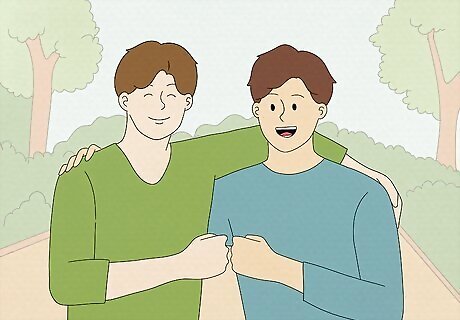
Be positive. Choose to nurture positive emotions, thoughts and conversations. People are attracted to other people and things that make them feel good. Practice being optimistic and looking on the bright side, so you spread your positivity to those around you. Focus on the big picture instead of the individual obstacles that stand in the way. Expand your interests beyond your personal issues. Everyone likes the person who can set aside personal concerns, lighten up and be engaged with what others have to say. Show gratitude for the people, events, successes and experiences in your life. Let this feeling of being grateful spill over into your conversation, and let the person know you are happy to meet him or her.Keeping a journal of everything that you are grateful for on a daily basis can help you to stay positive before and after meeting new people. Catch yourself when you think negative, critical or judgmental thoughts about yourself or other people. Counter these negative thoughts with 2 positive things about the person or yourself. Maintain a positive posture, keeping your back straight, shoulders slightly back, chin held high and your arms wide. Holding this posture during conversations can make you appear confident and positive and can reinforce your positive feelings.
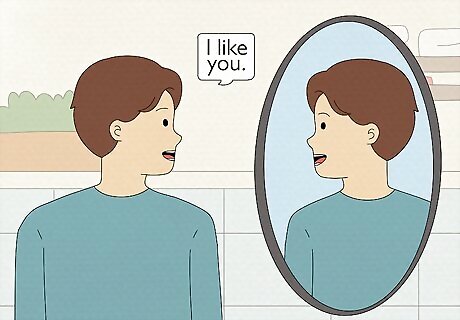
Cultivate confidence. Your body language is not the only thing that will benefit from you thinking and behaving more confidently. Your relationships, self-esteem and ability to persuade people will also be enhanced. You should realize that you have value, are talented, skilled and have something to offer that others want or need. Speak up when you have something to say and speak with confidence. Don't phrase what you say as a question with your tone of voice rising at the end. Make statements and don't use uncertain phrases like "I think". Tell yourself daily what makes you special. Look in the mirror and say, “I like you.” When you can like yourself, others will like you too. Recognize when you do a job well, and focus on solutions instead of problems.

Be energetic. Energy can be passed to others through your enthusiasm and excitement. Being a positive, confident, upbeat person with a can-do attitude will influence others in a good way. They will want to get to know you so they can feed off of your charisma and figure out where all that energy is coming from. Feel free to express your passion for a subject, hobby, project or individual. Getting a good night's sleep, going to bed at the same time every night, turning off all lights and avoiding alcohol as well as large meals before bed can help you feel more energetic in the morning. Drink water in the morning to replenish your body and eat breakfast. Get 15-30 minutes of exposure to natural outside light or use a light box if it is cloudy. Take a walk. Being outside in nature for at least 20 minutes can make you 20 percent more physically and mentally energetic. Avoid caffeine and energy drinks.
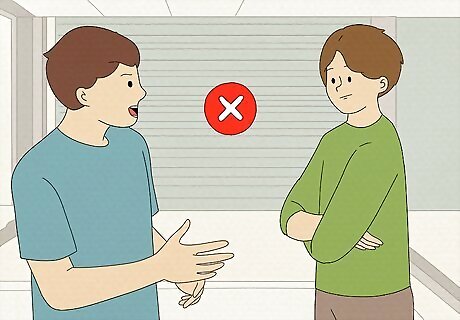
Don’t be pushy. Pushy people are stressful. It is difficult to like someone who imposes their ideas, beliefs and choices on you. Be flexible and able to adjust to different situations and personalities. When others realize you are easy-going and open-minded, getting along with you will be easy too.

Be funny. Sharing laughter connects people on a deeper level. People are attracted to those who can make them laugh or who take a carefree approach to life and conversation. If you aren’t the funny type or aren’t comfortable joking around, then try to see the humor in something. It is natural to feel a bond with people who can laugh easily.

Be a good listener. Everyone wants to be around someone who will listen to them. Always pause after talking, look at the person and wait for a response. When they speak, maintain eye contact, nod your head and make sounds that express that you agree. Listening shows that you are interested in what the other person has to say, while rephrasing what the person said or asking questions afterward proves that you were listening.
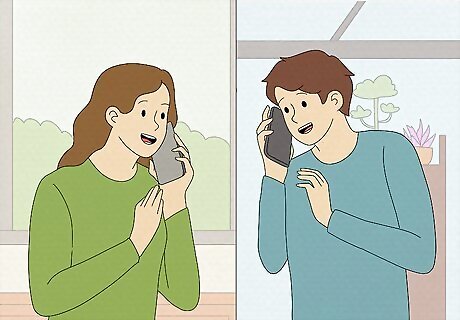
Follow up. Following up demonstrates your interest and further confirms that you were listening during the conversation. You can use something that came up during the conversation and relate it to another experience that reminds you of the person. For example, you might mention that you passed by a coffee shop with tables outside and recalled that the other person enjoys drinking coffee outside. You could then use the opportunity to request a follow-up meeting at the coffee shop. You can follow up in-person or via a note, phone call or email. If you can, remember specific dates that are important to the person, such as a birthday, anniversary or graduation dates. Send out cards or do something special for that person.
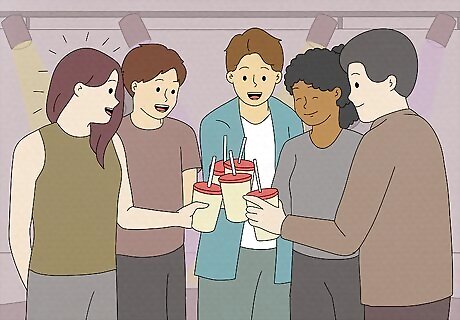
Place yourself in dynamic situations. Many people call this, “putting yourself out there.” Whether you are looking for a new job, new boyfriend or new contacts, placing yourself in an environment with new people regularly will make your more at ease in social situations. It will also allow various types of people to connect with you. When you are out and about, don’t stand in a large group. Make sure you are with no more than 2 other people. Large groups of men and women can be protective of each other, and you will give the signal that you are not looking for someone outside of your group.












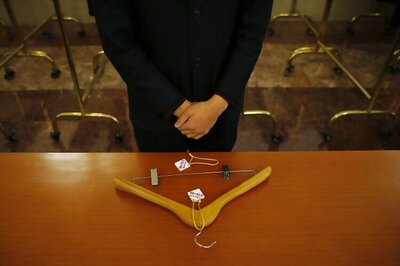






Comments
0 comment